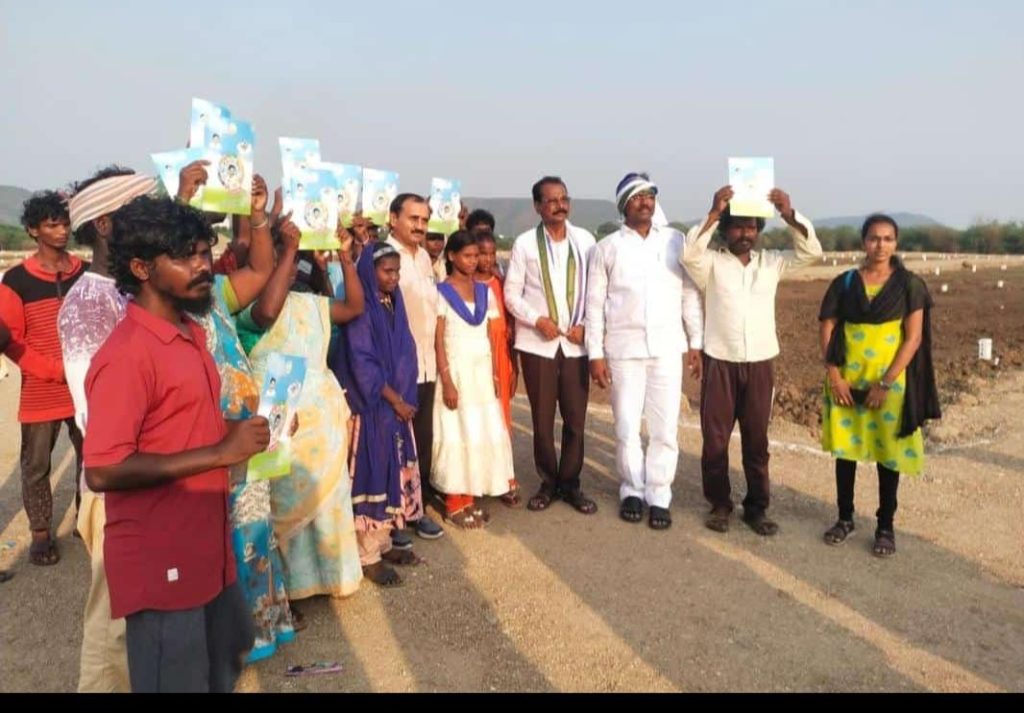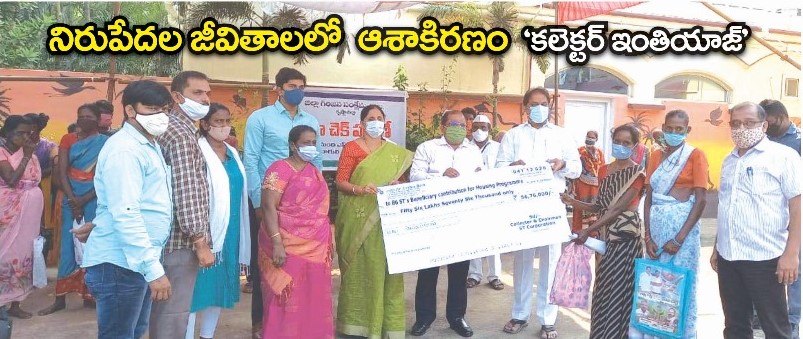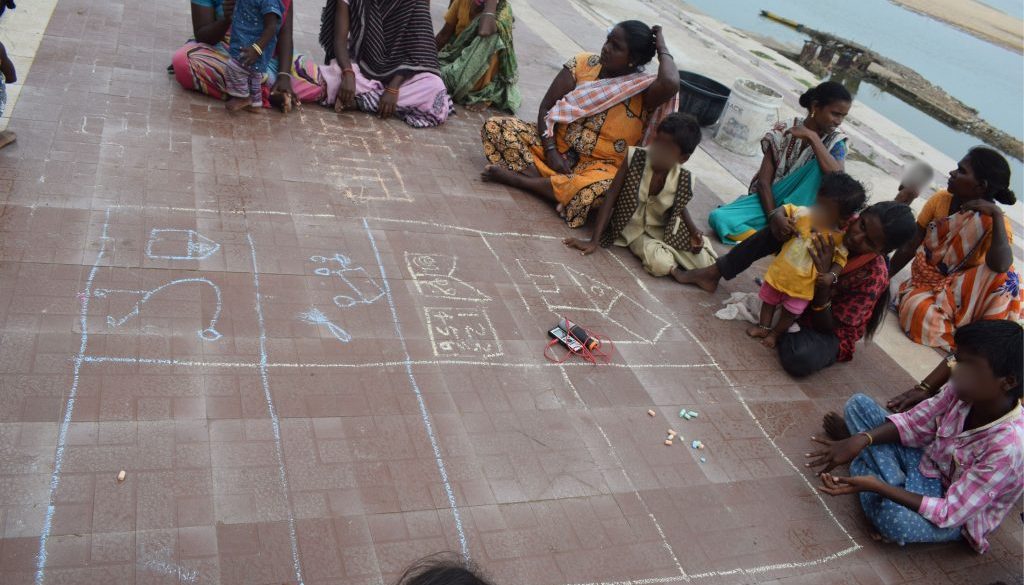IMPACT STORY – Building hope: Waste pickers unite for secure housing in Andhra Pradesh
Authors: The George Institute, India with the ARISE Consortium
Since 2019, ARISE researchers from The George Institute (TGI), India have worked with partner organisations and waste pickers in the informal settlements in Vijayawada-Guntur of Andhra Pradesh to identify and address priority areas to improve their health and wellbeing. During priority-setting activities in 2021, community members highlighted an urgent need for secure housing and set about identifying actions to address this. The process resulted in allocation of secure housing or land ownership to some community members and has helped establish better relationships between the community and governance actors.
Background
For waste workers in informal urban settlements of Vijayawada-Guntur, Andhra Pradesh, India, secure housing is not just a roof over one’s head but embodies dignity and security. While waste workers have historically faced threats of repeated displacement, this threat became much worse during and after the Covid-19 pandemic.
“Somehow get us housing, we can manage everything else” – Female waste picker, Vijayawada
“When I die, I do not want to be considered an unidentified body. I want to be taken to my own place and get my last rites done.” – Female waste picker, Dump yard in Guntur, Andhra Pradesh
As part of ARISE, TGI worked with waste pickers from Krishna Lanka and Vaddeswaram informal settlements, using the community-based participatory research (CBPR) approach, to understand and address the priorities of the waster worker communities. Between 2019 and 2021, ARISE TGI researchers held community meetings, interviews and focus group discussions with community members.
In September 2021, after Covid-19 restrictions had eased to a certain extent, researchers from TGI and our local partner organisation Dalit Bahujan Resource Centre (DBRC) undertook prioritisation exercises with the community members. The aim was to seek and centre the community members’ inputs for decision-making and accountability-seeking. From a range of identified priorities, housing emerged as the highly ranked issue for the community members.
Community members also highlighted the linkages between housing rights and health and well-being. The threat of repeated displacement greatly increased after the Covid-19 pandemic. In 2022, the waste workers in these informal settlements faced aggressive threats to their housing rights. Residents of Krishna Lanka were unfairly blamed as being carriers of the Coronavirus and were subsequently evicted from the area. Community members also repeatedly expressed how women, particularly young girls, were very vulnerable to sexual harassment due to lack of proper housing and sanitation.
The team realised that securing housing for the community members was the most crucial task at that moment. Researchers and DBRC worked towards better understanding processes for housing allocation, be it through engagements with the local secretariat office or through various housing entitlement schemes. DBRC also played a crucial role in facilitating dialogue between the community and governance actors throughout 2022 and 2023.They engaged in consistent follow-up, supporting the community to advocate for their and needs.
To further address this identified need, actions were identified and allocated to community members, researchers, and DBRC. Community members took steps to get their identification documentation completed, DBRC worked with the local secretariat office to get housing allocated, and the research team looked at the various schemes under which housing could be made available for the communities.
After numerous petitions and persistent efforts, the government responded by launching a mass drive to issue identity cards to community members. This was a significant step towards addressing their immediate housing needs, marking a pivotal moment in their struggle for stability and recognition.

Communities in Vaddeswaram showing their land ownership documents. Communities were allotted plots and government will be building houses for them.
Impact
In October – November 2022, 12 families from Krishna Lanka were allotted housing in Rajarajeswari peta, a neighbourhood in the city of Vijayawada, and 35 families are in the process of being allotted housing. And in 2023, 11 families living in Vaddeswaram were allotted plots in Amaravati, the capital city of Andhra Pradesh. However, 25 families are still waiting for housing due to bureaucratic delays and the requirement for mandatory identity cards. Whilst this has caused a great deal of distress for the community, TGI researchers and DBRC are supporting community members to obtain identity cards. However, the 2024 change in government has unfortunately halted the process as the new administration has yet to revisit and address this pressing issue.
The team and community members have encountered situations that required collective problem-solving. After allotment of houses in Krishna Lanka, the community was unexpectedly asked to pay INR 60,000 to the municipal corporation. While this was the subsidised rate decided by the authorities, it was a major setback for community members considering the myriad forms of deprivation and insecurities they were already regularly facing. The most viable solution was to rely on the Scheduled caste and Scheduled Tribe Sub-Plan (SCSP/TCP) for a ‘Direct Benefit Transfer’ (DBT) to community members. After several meetings with Tribal Welfare Department officials, multiple visits, and petitions by the community members, a one-time DBT was provided to all the people who were allotted housing, and they were finally able to move to their houses.
This process – from the identification of housing as a priority to working together to get governance actors to allocate housing – has helped ARISE TGI researchers to solidify relationships with the community, establish our commitment to the embeddedness of research and action, and strengthen trust with the community.
The process also improved access to information, enabling waste workers to navigate the bureaucratic processes involved in obtaining housing or any other benefits from governments in future.
Importantly, it has established pathways for relationships between the community and governance actors. Community members have realised that there are ways to voice their grievances, demand their rights, and get action from the governance actors.
Observing the community’s persistence, government officials started paying more attention to their issues and have even sought their involvement in various government activities, including introducing new initiatives, awareness campaigns, and community meetings.

Communities from Krishna Lanka receiving the one-time amount disbursed from the tribal department for housing allotment.
Lessons
Through this process, ARISE researchers, community members and governance actors learned the following lessons:
- Recognising housing as a priority, and improved understanding of linking housing rights to health and well-being.
- Improved access to information, enabling waste pickers to navigate the bureaucratic processes involved in obtaining housing or any other benefits from governments in future.
- Secure housing can provide women with a sense of ownership and control over their living space. It also gives them a sense of permanency and gives them the confidence that they are leaving some asset behind for the next generation.
What next
The connections established with governance actors during this process have been maintained by community members, who regularly visit government offices to address their ongoing concerns, including:
- Addressing unintended consequences: In certain cases, the allotted housing was suboptimal and lacked thorough consideration. Community members had little choice about the location and type of housing they received. Some homes had water issues and security risks; others were in locations further away from people’s livelihoods, affecting their ability to get to work. The team is working towards ameliorating these issues and understanding scope for further developments in this area.
- Securing utilities: The community has come together to take collective action in securing reliable access to clean water and electricity, resources that were not assured by the local authorities or utility providers when their housing was allocated.
- Enhancing advocacy: Building on their past successes, the community is refining its strategies to tackle other systemic issues and assert their rights. Community-led meetings are proving to be invaluable for sharing information and planning future actions.
- Sustaining support: DBRC and the ARIISE TGI research team continue to support the community to navigate emerging challenges and to facilitate deeper engagement with governance actors.
Acknowledgements
Thank you to Sweta Dash, Louise Clark, Kate Hawkins, Nazia Islam, Jiban Karki, Leah Murphy, Anthony Mwaniki, Hayley Stewart, Joe Taylor and Sia Tengbe for developing and editing this output.
